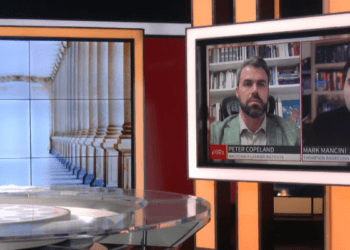Catch up on all things MLI with our latest newsletter.
Highlights of this edition include a new paper by MLI board member Lincoln Caylor and his colleague at Bennett Jones LLP in Toronto, Gannon G. Beaulne. The paper is intended to bring perspective to the rather one-sided public debate on the issue of mandatory minimum sentencing tools. Caylor and Beaulne establish in their paper that judicial discretion in sentencing has never meant an unfettered entitlement to impose any sentence deemed appropriate by a particular judge. In the report, titled “Parliamentary Restrictions on Judicial Discretion in Sentencing: A defence of mandatory minimum sentences“, Caylor and Beaulne argue these sentences are effective tools for consistently applying the law while ensuring judges don’t provide too much leniency to those who have been convicted of crimes. They point out that Parliament has a role to play in ensuring the application of justice is consistent with the moral judgment of society.
The newsletter also highlights a major new commentary paper that argues the merits of devolution – transferring government power, authority and resources from the national government to sub-national governments – in the quest to improve governance for the Yukon, Northwest and Nunavut territories. The paper, titled “An Unfinished Nation: Completing the devolution revolution in Canada’s North“, identifies the successes and failures of major recent changes to how residents of the territories govern themselves. But they note that many in the North “still lack the services, equality of opportunity, and political authority necessary to effect positive change”.
Meanwhile, MLI Managing Director Brian Lee Crowley generated lots of letters to the editor with a column he wrote for the Globe and Mail looking at Canada’s resource wealth. Crowley argues that having abundant resources is not what makes Canada a wealthy country. Many poor or troubled states have great natural resources, while other wealthier countries have “no natural resources to speak of”, he writes. Crowley argues that Canada is wealthy because “it exists within another vastly more important endowment of rules, institutions and behaviours”.
Also in the newsletter, MLI Senior Fellow Ken Coates and University of Saskatchewan professor Greg Poelzer shine a spotlight on neglect in Canada’s “provincial Norths”. In a paper, titled “The Next Northern Challenge: The Reality of the Provincial North”, the authors highlight a politically marginalized portion of the country that faces social and economic problems which are more daunting than those in the southern part of the country or even parts of the northern territories. That’s despite their vast potential: the northern portion of seven provinces together have close to 1.5 million residents, enormous resource possibilities and various First Nations groups.
The newsletter has also has information on a new column from Crowley in Diplomat and International Canada, a column MLI Senior Fellow Alex Wilner and Dalhousie research fellow Anita Singh published in the Globe and Mail on how elections in India will affect that country’s relationship with Canada, a speech Crowley is set to deliver in Montreal this month and the latest MLI op-eds, commentaries and media coverage.




